- Originally published: June 16, 2022
- Last updated: May 28, 2025
Meeting room booking software (also called conference room management software or room scheduling software) helps you easily reserve rooms for meetings. Instead of writing names on a whiteboard or sending emails back and forth, you just open the app or website, pick an available room and time, and click “book.”
That’s great, but if you’re looking for a meeting room booking system for your office, you’ve got plenty of options — over 37, in fact. At Archie, we know a thing or two about room scheduling software, so I’ve used our team’s expertise to put together an unbiased guide and help you find the best meeting room booking software for your needs.
Guide to the best room booking software
What is the best meeting room booking system?
Archie is the best meeting room booking software if you need a flexible, affordable, and easy-to-use solution. For companies that need more advanced features and don’t mind paying a little extra for a more complex system, OfficeSpace is a solid option. And if you want a system that works directly within Slack or Microsoft Teams, Officely is the way to go.
Benefits of using the best meeting room scheduling software
Why do people love using room booking software?
- It saves time. You can quickly book rooms without chasing people or sending emails.
- No double bookings. Everyone sees real-time availability, so no one gets surprised.
- More focus, less hassle. People can get back to work instead of hunting for a space.
- Fewer no-shows. Reminders and check-ins help make sure rooms don’t sit empty.
- Smarter planning. You get insights on how rooms are used, so you can plan space better.
Lots of different places use room scheduling software: businesses, coworking spaces, schools, and even event venues. Employees use it to book meeting rooms. Office and facility managers use it to keep everything running smoothly. HR teams also love it because it helps them manage who’s in the office and when — especially in hybrid work setups.
Most of these tools can handle more than just meeting rooms. You can also manage desks, parking spots, and even shared office equipment.
Key features to look for in the best meeting room booking software
Real-time availability
Good room booking tools let you check availability in real time. That means no guessing, no double-booking, and no awkward moments when two people show up for the same room. Everyone sees the same up-to-date info, whether they’re at their desk or on the go.
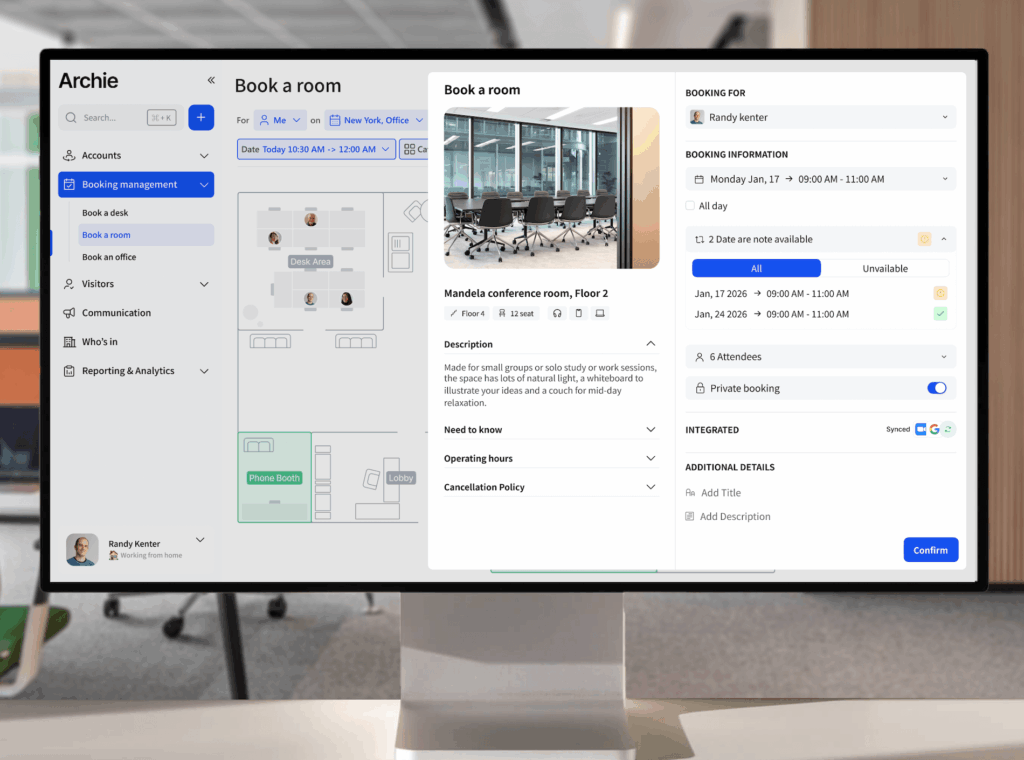
Recurring room reservations
If your team has regular weekly meetings, you shouldn’t have to book them every single time. Look for software that supports recurring bookings so you can set it once and forget it.
Third-party integrations
Make sure the software connects with apps your team already uses, like Microsoft Office 365, Google Workspace, or Slack. This way, when someone books a room, it automatically shows up in their calendar — and if they make a change in the calendar, it syncs back too.
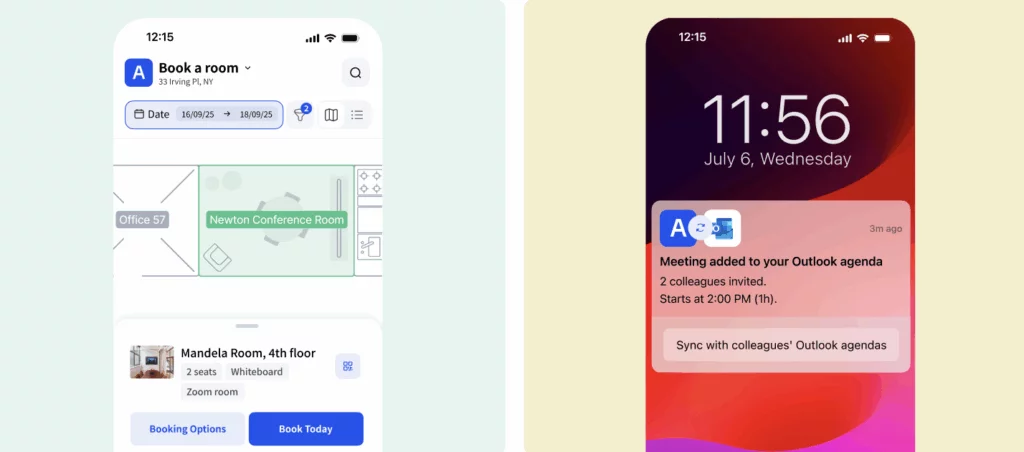
Smart filters
Help your team find exactly what they need. Maybe they want a room with a whiteboard, a TV screen, or space for 10 people. Good booking software lets them filter options so they don’t waste time clicking through every room.
Multiple booking options
Whether you’re at your desk, on your phone, or standing outside the room, it should be easy to reserve a space. Great tools let you book through a mobile app, web browser, or even a tablet mounted outside the room.
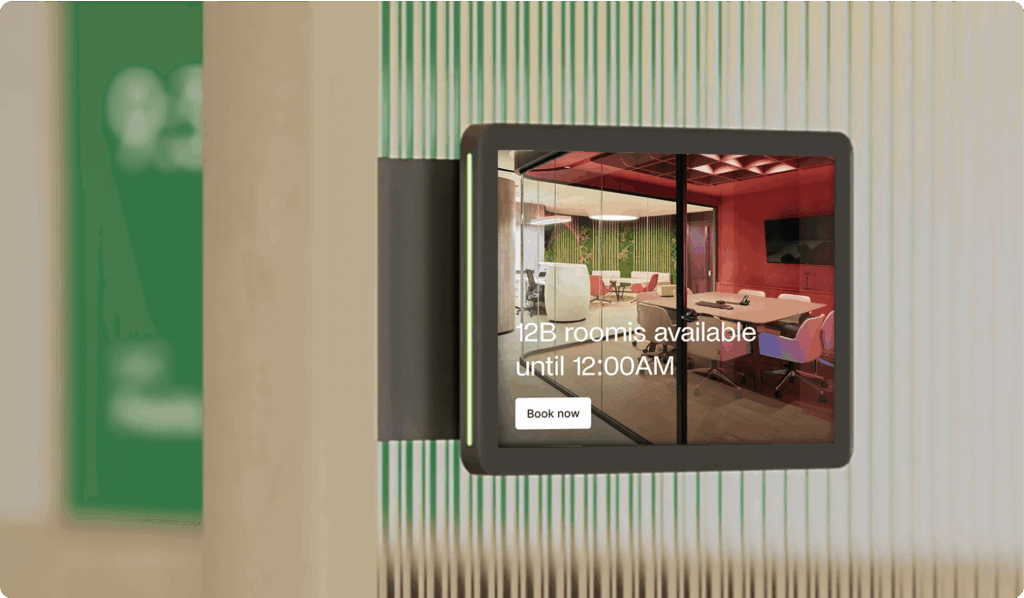
Check-ins and reminders
It’s easy to forget a meeting or grab a room without showing up. That’s where check-ins and automatic reminders come in. Some systems will even cancel a booking if no one checks in — so the room becomes available again for others to use.
Booking policies and permissions
You should be able to control how people use the rooms. Want to limit certain rooms to specific teams? Or prevent people from booking more than two weeks in advance? The right software lets you set all that up easily.
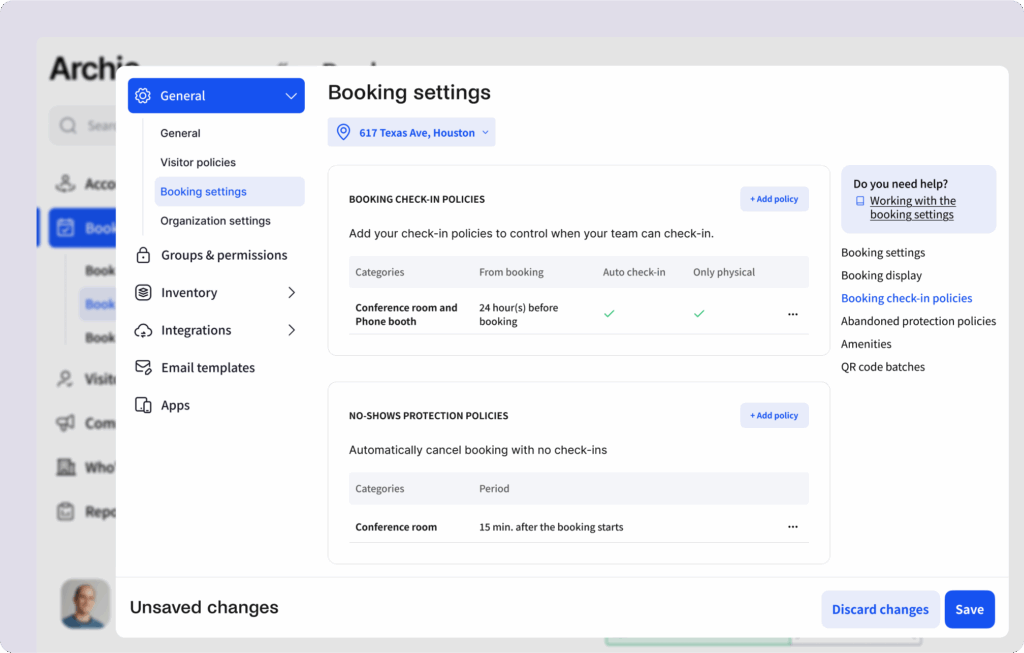
Data insights
Want to know the average meeting room occupancy? Which rooms get used the most? Or what times of day are the busiest? Good tools give you reports so you can spot trends and make better decisions, like when to add more meeting space or rethink your office layout.
Room booking system cost
It’s important to understand the final room booking system cost before you start comparing room scheduling solutions and their features.
Some room booking systems charge per user, while others, like Archie, charge per resource (meeting rooms, in this case). The per-resource model can save money, especially for larger companies with more employees than rooms. To give you an example, here’s a room booking system cost comparison:
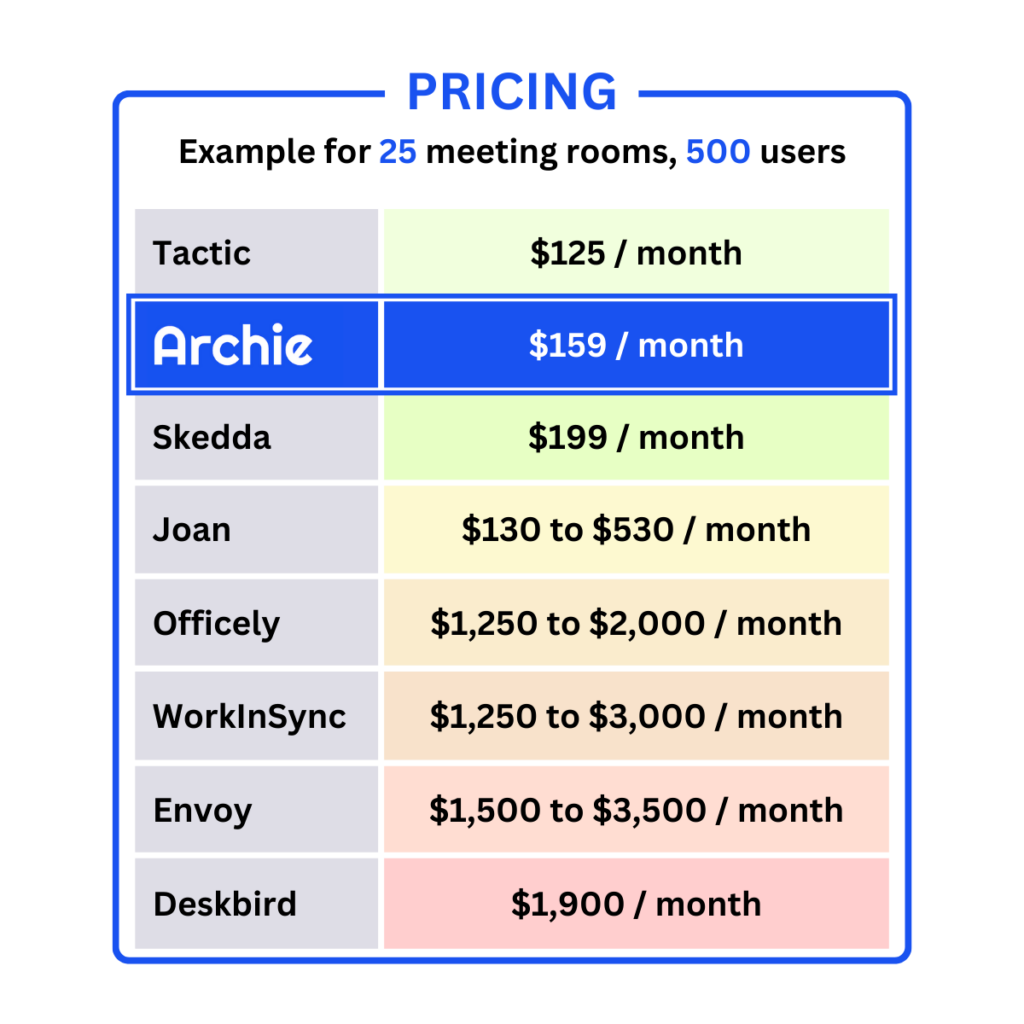
Whatever pricing model you choose, look for meeting room booking software with transparent pricing, no hidden fees, and the ability to scale as your business grows. Be careful, though—some basic plans may look affordable but might not include advanced features you’ll need for room booking.
Best meeting room booking software — shortlist
- Archie: Best meeting room booking software for affordable and scalable bookings.
- Envoy: Best for secure resource booking and visitor management.
- Robin: Best for resource booking with basic visitor management features.
- OfficeSpace: Best for space management on a bigger budget.
- Officely: Best for booking resources directly through Slack or Microsoft Teams.
- Eden: Best for onboarding and managing hybrid employees.
- Tactic: Best for organizing hybrid team schedules.
- Skedda: Best for custom booking workflows.
- Deskbird: Best for affordable and simple resource booking option.
- Kadence: Best for AI-assisted resource booking.
#1 Archie
Archie is an all-in-one workspace management platform that simplifies room booking, desk reservations, and visitor management. It’s ideal for hybrid work setups, offering a cost-effective pricing model that charges per resource (like desks or meeting rooms) instead of per user. This makes it an excellent option for companies with fluctuating in-office attendance.
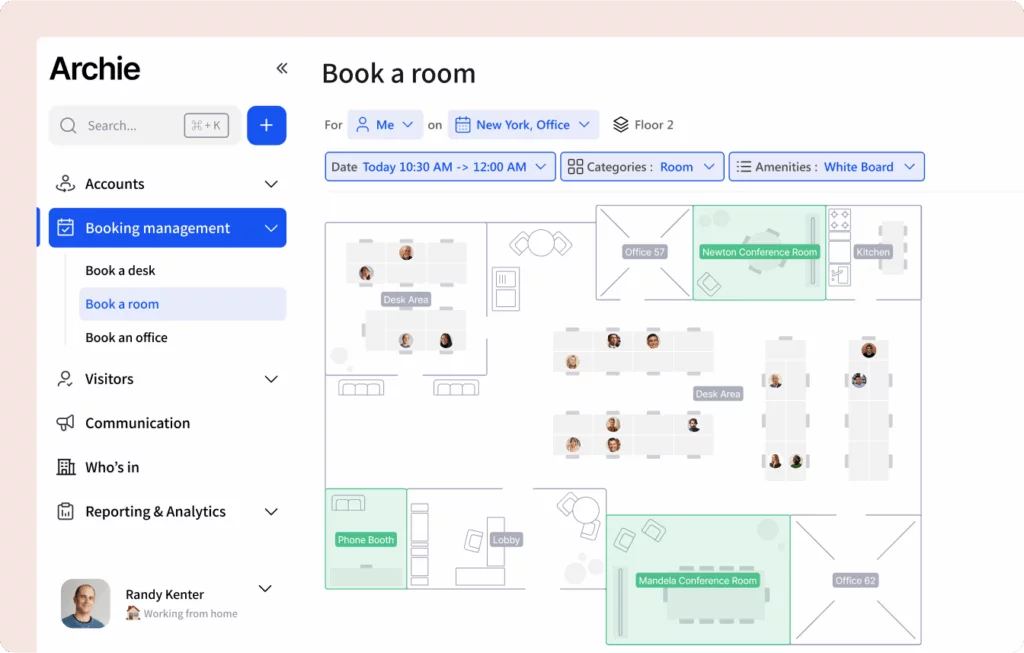
🔑 Key features
- Room and desk booking: Book meeting rooms and desks with ease. You can also book spaces for recurring meetings and assign permanent desks to employees who need them.
- Interactive floor plans: Your employees can use visual office maps to book desks and rooms—just click the spot they want, and that’s it.
- Meeting room display: Add display tablets and reduce time spent looking for people and places by live scheduling displays and office maps.
- Mobile access: Archie allows users to book spaces and manage reservations from their mobile phones. The mobile app is free to download on the App Store and Google Play, and it can be fully branded for an additional cost.
- Neighborhood zoning: You can create dedicated team zones, encouraging collaboration while keeping flexibility.
- Employee lookup: Archie makes it easy for everyone to check where coworkers are sitting or whether they’re in the office that day.
- Workspace analytics: Detailed reports on desk and room usage help you optimize office layouts and reduce wasted space.
🔎 Pros & cons
➕ Easy to use: Intuitive interface and quick setup make it simple for teams to adopt. Customer service is highly rated on platforms like G2.
➕ Cost-effective: Charges based on resources (not users), making it an affordable choice for hybrid teams that are growing.
➖ Better for larger teams: The Starter plan includes one location and 25 resources (meeting rooms, desks), making it ideal for hybrid setups with more users than desks or rooms. Smaller teams might not benefit as much from the pricing model.
💳 Pricing
Archie costs $159/month, including 1 location, 25 resources, mobile and room apps, in-app chat support, and full setup assistance. Visitor management is offered as a separate module. A free trial is available to help you test the features before committing.
#2 Envoy
Envoy is a reliable desk management platform that streamlines office operations while prioritizing workplace safety. It’s a great fit for companies looking to improve hybrid work setups without compromising security or efficiency.
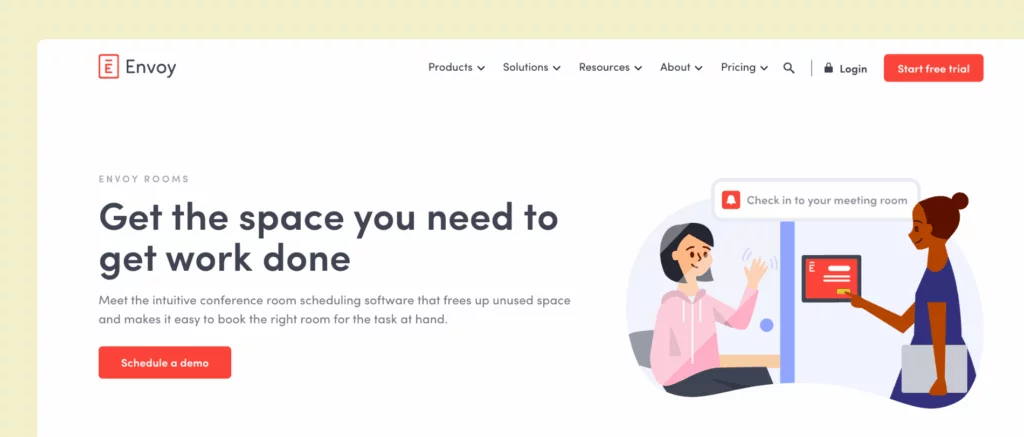
🔑 Key features
- Desk and room booking: Employees can quickly reserve desks or meeting rooms anytime, ensuring they have a space when needed.
- Workplace safety and compliance: Offers tools for visitor screenings, managing capacity limits, and handling emergencies, keeping your office safe and secure.
- Delivery management: Envoy tracks incoming packages and notifies employees when deliveries arrive, keeping records to avoid misplaced items.
- Analytics and reporting: Provides precise data on how office spaces are used, helping you make better decisions about layouts and resource allocation.
- Integrated experience: Envoy works with office tools like Slack, Microsoft 365, and Google Workspace, making it easy to fit into your current workflow.
🔎 Pros & cons
➕ Focus on workplace security: Features like touchless check-ins and visitor screenings improve office security.
➕ Detailed analytics: Envoy delivers valuable insights to help optimize office space and improve resource usage.
➖ Per-user pricing: Costs can add up quickly for larger teams or organizations with fluctuating office attendance.
💳 Pricing
Room booking starts at $5 per active user per month, billed annually. Visitor management is billed separately.
#3 Robin
Robin is an easy-to-use platform for managing office tasks like booking desks and meeting rooms. It’s especially helpful for businesses with hybrid work setups, offering real-time updates and seamless integration with popular tools to make reservations quick and hassle-free.
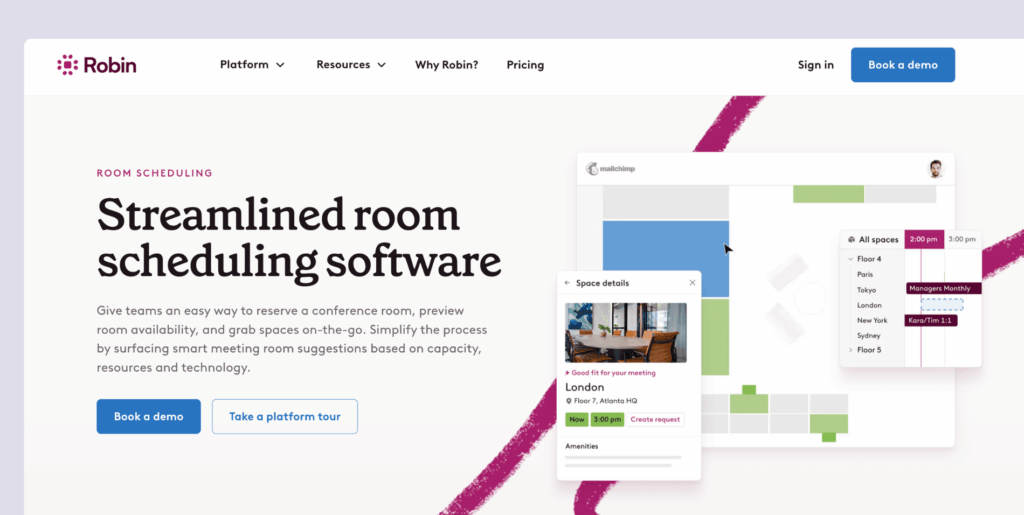
🔑 Key features
- Meeting room bookings: Your employees can check in at the door to confirm the meeting is taking place or tap once to book an open space.
- AI-assisted desk booking: Robin analyzes past bookings and employee preferences to automatically assign the best desk for each team member.
- Interactive office maps: Real-time maps show desk availability and office layouts, making it easy for employees to find and book a workspace.
- Employee check-ins: Multiple check-in options include QR codes, WiFi-based auto-check-ins, and access control integrations
- Advanced analytics: Gain insights into how your office is being used, identify busy times, and adjust layouts to meet employee needs.
🔎 Pros & cons
➕ Room & desk booking focus: Robin is tailored for desk and room booking, making it ideal for hot-desking and hybrid workplaces.
➕ Real-time updates: Interactive maps and presence indicators help employees find colleagues and available desks, boosting teamwork.
➖ Per-user pricing: Costs increase as your team grows, making it less budget-friendly for larger organizations.
💳 Pricing
Starts at around $70 per user per month. For detailed pricing, it’s best to contact Robin directly as they don’t list the pricing on their website. A 14-day free trial is available to explore the platform.
#4 OfficeSpace
OfficeSpace is a workspace management platform packed with desk and room booking features. It’s great for organizing office layouts and managing reservations but is best for businesses that can invest in premium tools, as it tends to be on the pricier side.
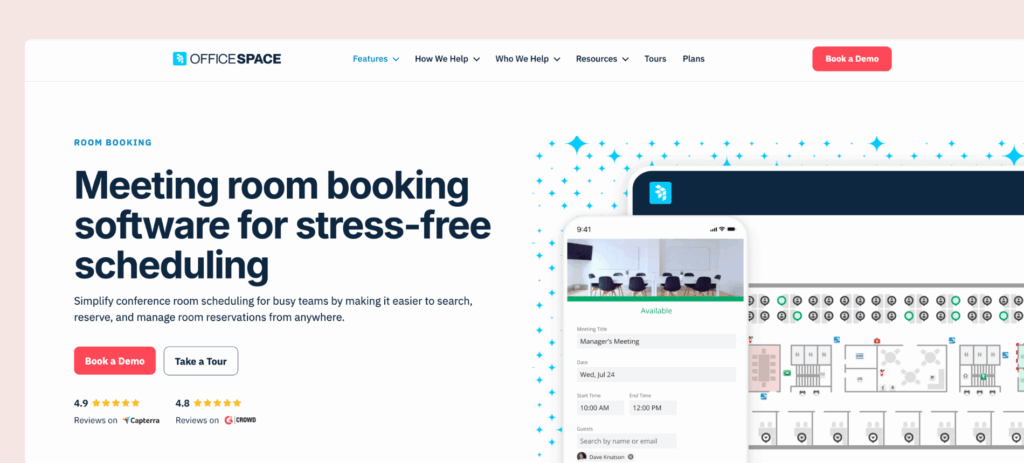
🔑 Key features
- Conference room scheduling: Easily book meeting rooms to help teams collaborate and avoid scheduling conflicts.
- Seat assignments: Assign permanent desks to employees who need them while keeping other desks available for hot desking or office hoteling.
- Visitor management: Includes a check-in system to enhance workplace security, though it’s a separate module and might not integrate as seamlessly as other solutions.
- Deliveries management: Notifies employees when their packages arrive and keeps records to avoid lost items.
- Analytics & reporting: Offers insights into how desks, meeting rooms, and other spaces are being used to help you improve office layouts and efficiency.
🔎 Pros & cons
➕ Comprehensive desk & room booking tools: OfficeSpace helps to easily manage hybrid workspaces with robust desk and room booking options.
➕ Advanced space management: Offers tools for space planning, move management, and detailed reporting—beyond just basic bookings.
➖ Expensive: The high setup fees and per-user pricing model can add up quickly for larger teams.
💳 Pricing
Pricing plans start at around $60 per user per month, depending on the features and team size. Initial setup fees are high, starting at around $2,500. Contact OfficeSpace directly for the most accurate and up-to-date pricing, as it’s not listed on their website.
#5 Officely
Officely is a user-friendly desk booking tool that works directly inside popular communication platforms like Slack and Microsoft Teams. It allows employees to easily book desks, meeting rooms, and other office resources without leaving the apps they use every day.
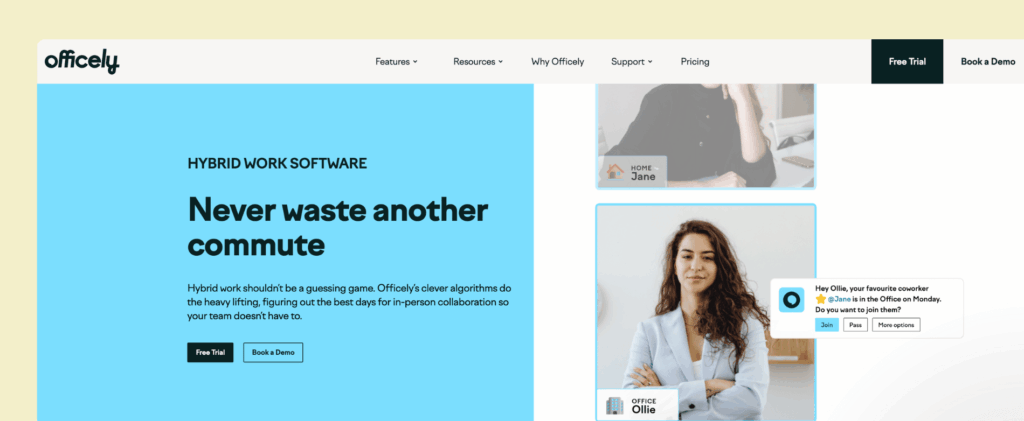
🔑 Key features
- Room booking: Employees can quickly reserve meeting rooms directly via Slack.
- Resource management: In addition to meeting rooms, Officely supports bookings for desks, parking spots, bike racks, and even pet-friendly spaces.
- Office visibility: Your employees can see who plans to be in the office on a given day, helping teams coordinate in-office schedules.
- Announcements and social planning: Officely makes planning office events, lunches, or team gatherings easy.
- Space usage insights: Provides data on office attendance and space usage to help you make smarter decisions about space layouts and resources.
🔎 Pros & cons
➕ Seamless integration with communication apps: Officely works directly in Slack and Teams, so there’s no need to switch between apps.
➕ Easy to use: The intuitive design makes desk and room booking quick and hassle-free.
➖ Slack dependency: Currently, booking meeting rooms can only be done via Slack. If your business doesn’t use Slack, Officely’s features won’t be as useful.
💳 Pricing
Starts at $2.50 per user per month. Officely is free for up to 10 users, and a free trial is available.
#6 Eden
Eden provides a full suite of tools to simplify office management. From onboarding new employees to helping workers check in, book desks, and complete wellness checks—all before arriving at the office—Eden makes managing a hybrid workplace easier and more efficient.
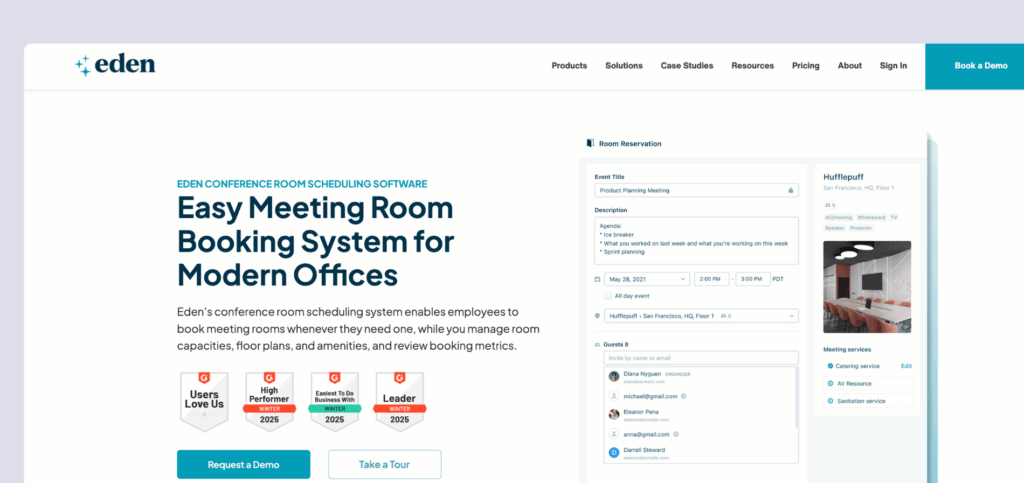
🔑 Key features
- Room scheduling: Your employees can reserve conference rooms, check in and out of meetings, and sync schedules with Google Calendar and Slack.
- Desk booking: Eden’s hot desk reservation system lets employees easily book a desk from anywhere. It also supports desk hoteling, assigns specific areas or seats, and tracks occupancy rates.
- Visitor management: You can track and manage visitors efficiently for a smooth, professional experience.
- Internal ticketing: Submit service requests for IT issues, maintenance, or other needs using built-in tools.
- Third-party integrations: Eden integrates seamlessly with Slack, Microsoft Teams or Google Calendar, and offers SSO and directory syncing to keep your office organized and running smoothly.
🔎 Pros & cons
➕ All-in-one solution: Covers desk booking, room scheduling, visitor management, and more, making it ideal for modern workplaces.
➕ Scalable pricing: Flexible pricing options work for businesses of all sizes.
➖ Limited customization: While versatile, it may lack certain features and customization options some competitors offer for specialized workflows.
💳 Pricing
From $15 per room per month (billed annually). Desk booking starts at $2.25 per desk per month and is sold in bundles of 25 desks. Visitor management is charged additionally.
#7 Tactic
Tactic makes it easy for hybrid teams to reserve desks and meeting rooms, whether they’re working from home or in the office. It integrates smoothly with popular tools like Slack and Microsoft Teams, and its straightforward design makes it a great choice for businesses transitioning to hybrid work.
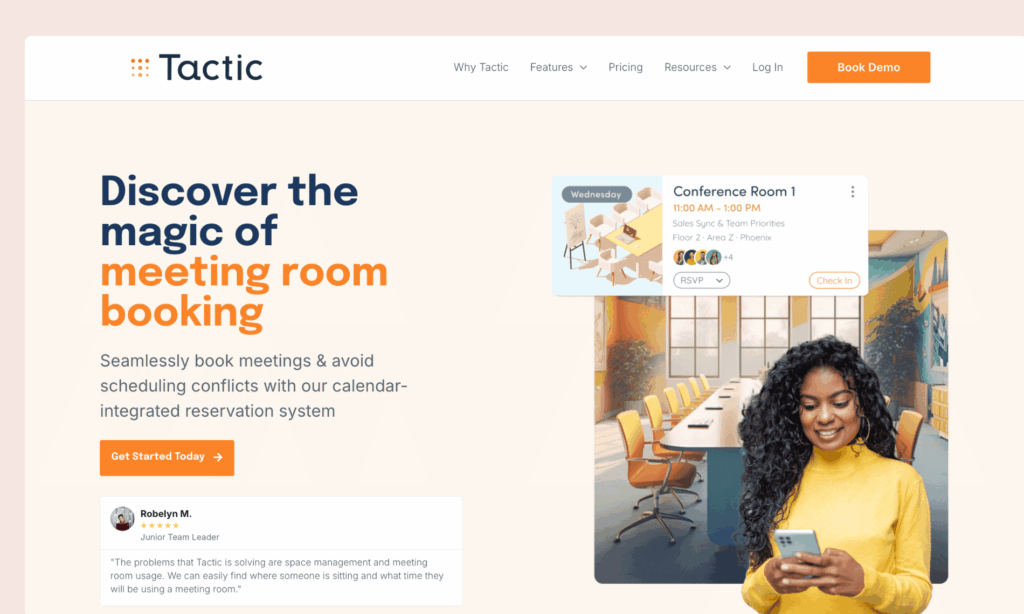
🔑 Key features
- Meeting room reservations: Let employees easily book meeting rooms so teams have the right spaces for collaboration without double bookings.
- Desk booking: Employees can quickly reserve desks, which is especially helpful for hot desking setups.
- Desk zones: Organize desks by floors or specific areas to assign spaces to different teams or departments.
- Seating assignments: Assign desks to employees permanently or temporarily to meet individual needs or preferences.
- Future booking limit: Set limits on how far in advance desks can be booked to ensure fair access for everyone.
🔎 Pros & cons
➕ Easy to use: Tactic’s simple interface allows employees to book desks and rooms easily, and managers can monitor space usage effectively.
➕ Flexible resource management: Tactic includes smart features like automated desk assignments and customizable booking rules to fit different workplace needs.
➖ Login issues: While users find it easy to use overall, some have reported problems logging into the app, especially the first time.
💳 Pricing
Pricing starts at $6 per room per month, with desk booking and visitor management add-on priced separately. There’s a free trial available so you can explore all the tools before committing.
#8 Skedda
Skedda is a user-friendly platform for booking desks and managing office spaces. With features like interactive floor plans, custom booking rules, and seamless integrations, it’s a great option for hybrid offices, coworking spaces, and venues looking for a straightforward but effective way to optimize space usage.
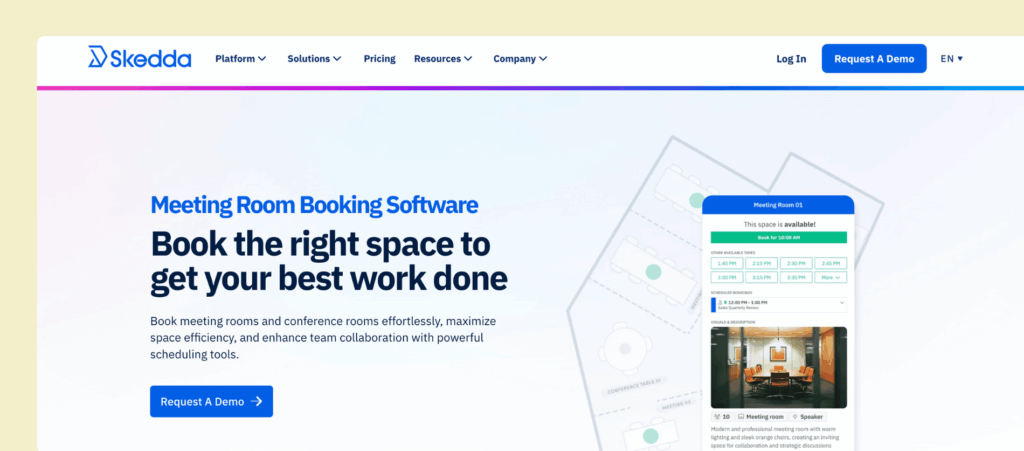
🔑 Key features
- Desk & meeting room booking system: Skedda’s drag-and-drop interface makes it easy to book desks and meeting rooms, showing real-time availability to prevent double bookings.
- Interactive floor plans: Customizable maps give your team a clear visual of the workspace, making it simple to select the perfect spot.
- Custom booking rules: Set specific rules, such as time limits, cancellation policies, and user permissions, to manage space use.
- Neighborhoods: Organize the office into zones so teams can sit together when needed.
- Integration capabilities: Skedda connects seamlessly with tools like Slack, Kisi, ServiceNow, and Google Workspace.
🔎 Pros & cons
➕ Easy to use: The simple design makes it easy for anyone to book and manage spaces with minimal training.
➕ Customizable rules: Flexible settings let you control how spaces are used, helping to improve efficiency.
➖ Limited analytics: While Skedda includes reporting, it doesn’t offer the detailed analytics available in some competing platforms.
💳 Pricing
Starts at $99/month for up to 15 spaces. Higher-tier plans and a free trial are available.
#9 Deskbird
Deskbird is an easy-to-use platform for booking desks and meeting rooms. It’s a great fit for companies looking for a simple, no-fuss solution to reserve office spaces without the complexity of more advanced tools.
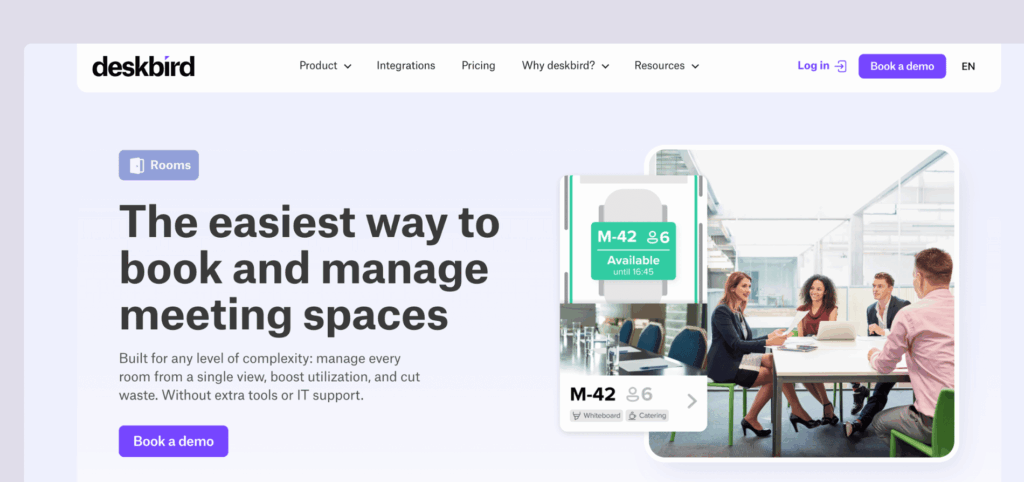
🔑 Key features
- Complete resource management: Deskbird lets you reserve meeting rooms, desks, parking spots, and other office resources, giving you full control of your workspace.
- Interactive floor plans: The platform includes office maps that make it easy to find and book available workstations at a glance.
- Social feed: Employees can see when colleagues plan to be in the office, making coordinating schedules and planning team days easier.
- Mobile access: The mobile app allows employees to book desks and rooms from anywhere, giving them flexibility on the go.
🔎 Pros & cons
➕ User-friendly design: The interface is simple and intuitive, making it easy for employees to get started with little to no training.
➕ Affordable and focused: Offers essential desk and room booking features at a budget-friendly price, ideal for companies that don’t need extra functionalities.
➖ Limited features: Lacks advanced options like visitor management that other platforms provide.
💳 Pricing
The Basic plan starts at $2 per user per month. Its features can be explored during a free trial.
#10 Kadence
Kadence is a straightforward booking tool that helps hybrid teams reserve desks and meeting rooms with ease. It’s designed to simplify office space management, boost team productivity, and reduce real estate costs. Users appreciate Kadence for its simple interface and excellent customer support.
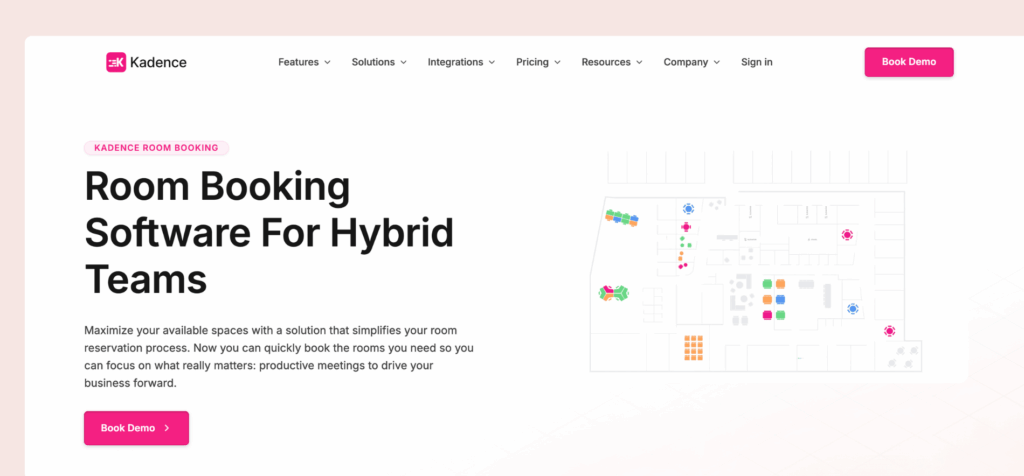
🔑 Key features
- Smart desk & room reservation: Employees can quickly reserve desks and meeting rooms, ensuring they have a workspace when needed.
- Interactive floor plans: Visualize the office layout with color-coded maps that show popular areas and available desks.
- AI-assisted booking: Kadence AI helps employees book multiple desks, manage reservations, and get updates when teammates change plans.
- Real-time notifications: Your employees can receive alerts when teammates cancel bookings or when favorite desks become available.
- Mobile app: Employees can book desks anytime from anywhere, whether they’re at the office or working remotely.
🔎 Pros & cons
➕ Easy to use: The simple interface makes it quick for employees to learn and start using.
➕ Great support: Users consistently praise the responsive and helpful customer support team.
➖ Limited customization: Kadence may lack the flexibility to adjust to highly specific workflows.
💳 Pricing
Starts at $4 per active user per month. Custom pricing is available for larger enterprise plans.
Full list of conference room management software options
Need more meeting room management software options? Here’s a full list of room booking software to help your team find the best fit:
- Archie: All-in-one platform for booking desks and rooms, managing visitors, and tracking workspace usage.
- Envoy: Combines desk booking, visitor management, safety compliance, and workplace analytics in one platform.
- Robin: Specializes in desk and room scheduling, plus tools for managing office resources and analyzing usage.
- OfficeSpace: Advanced space management with desk booking, meeting room scheduling, and real-time analytics.
- Officely: Integrated with Slack and Teams for easy desk management and hybrid work planning.
- Eden: Combines desk booking, visitor management, internal ticketing, and safety features for a well-rounded solution.
- Tactic: Perfect for hybrid workplaces with tools for desk and room booking, team coordination, and office insights.
- Skedda: Offers interactive floor plans, online booking, and customizable rules for desk and room reservations.
- Deskbird: Easy-to-use system for desk and room bookings, focused on mobile access and user experience.
- Kadence: Provides desk and room booking with AI-powered space management and team coordination.
- Smartway2: Intelligent scheduling software for desks and rooms with powerful analytics and integrations.
- UnSpot: All-in-one desk reservation tool for hybrid offices with space usage analytics.
- Clearooms: Simple hot desk & conference room management software designed for flexible workplaces.
- Othership: Resource booking platform tailored for hybrid teams to optimize collaboration and office use.
- Hybo: Desk and workspace reservation tool for hybrid work models.
- YAROOMS: Comprehensive platform for booking desks and rooms, digital signage, and visitor management.
- FMS:Workplace: Combines software and hardware for seamless scheduling and space optimization.
- WorkInSync: Hybrid workplace platform with desk booking and meeting room management features.
- Nibol: Lets teams book desks and meeting rooms for a connected hybrid experience.
- Whatspot: Simple tool for booking desks, rooms, and parking spaces.
- Eptura: Full-featured desk booking and workspace management system with advanced analytics.
- OfficeRnD: Focused on coworking spaces, offering desk booking and member management tools.
- Zynq: Scheduling tool for hybrid work with desk and room booking to encourage collaboration.
- AgilQuest: Desk booking and meeting room reservation software with usage analytics.
- Meetio: Focuses on room and desk booking with seamless calendar integration.
- GoBright: A full-featured solution for desks, rooms, and visitor management with efficiency tools.
- MyDesk: Straightforward desk booking system for managing hybrid work schedules.
- Nexudus: Management software tailored to coworking spaces with desk booking and community engagement.
- Spacewell: Optimizes office layouts with desk & room booking and IoT integration.
- Spaceti: Focused on workplace digitalization with desk booking, room scheduling, and occupancy monitoring.
- Flydesk: Simplifies managing hybrid workplaces.
- Ronspot: Designed for hybrid offices to streamline desk bookings.
- Cloudbooking: Flexible desk & room booking tool for hybrid teams.
- Hybridhero: Combines HR and workplace management with desk and room booking features.
- Poppulo: Mobile app with desk and room booking capabilities.
- Joan: All-in-one platform for managing desks, rooms, visitors, and office assets.
- Tidaro: Helps manage hybrid work environments with desk and room booking tools.
And now comes the fun part—picking the best room management software for your team.
How to choose the right meeting room management software
1. Figure out what you need
Many platforms offer more than just room booking—they include tools for desk scheduling, visitor management, and workspace analytics. Look for a platform that lets you choose only the features you need. Some offer bundled packages, but others let you customize your plan, so you only pay for what’s relevant to your business. Speaking of plans…
2. Compare the room booking system cost
Traditional platforms charge per user, which gets expensive as your team grows. Newer options like Archie charge per resource (like meeting rooms, in this case), can save money for larger teams.
Here’s an exemplary pricing comparison for 20 meeting room and 300 employees, charged per month in US dollars:
💰 Archie from $159 ($159 for 25 resources, like desks and meeting rooms, per month)
💰 Skedda from $199 ($199 per month, 25 “spaces” included)
💰 Officely from $750 ($2.50 per user per month, room booking through Slack)
💰 Kadence from $1200 ($4 per active user per month)
💰 Envoy from $1500 ($5 per active user/month when billed annually)
Also, look for platforms with upfront pricing. Some, like OfficeSpace, include setup fees, so be sure to compare the overall value—not just the starting room booking system price.
If you don’t need all the features right away, choose a platform with flexible pricing plans and customizable features. This way, you’re not overpaying for tools you don’t need yet, but you can easily upgrade as your business grows.
3. Check the overall user experience
- Easy to use: The software should be simple enough for everyone to use without much effort. Tools like Archie and Robin are known for their user-friendly interfaces.
- Support and training: Responsive customer support and training materials can make a big difference. Providers like Archie and Kadence stand out for their helpful resources and guidance.
- User reviews: User reviews on sites like G2 can give you a clearer idea of how reliable and effective the software is.
- Integrations: Check if the platform integrates well with tools you already use, such as your calendar, HR systems, or communication apps like Slack and Microsoft Teams.
- Demos and free trials: Most room booking solutions offer live demos and some—free trials. Use these to see the platforms in action and evaluate the company’s support.
Now, go ahead, consider your options, and make sure the software you choose meets both your current needs and your long-term goals. And if you’re ready to try one out, Archie offers a free trial to get you started.

Berenika Teter
Archie's Content Manager, fueled by filter coffee and a love for remote work. When she’s not writing about coworking spaces and hybrid workplaces, you can probably find her exploring one.




















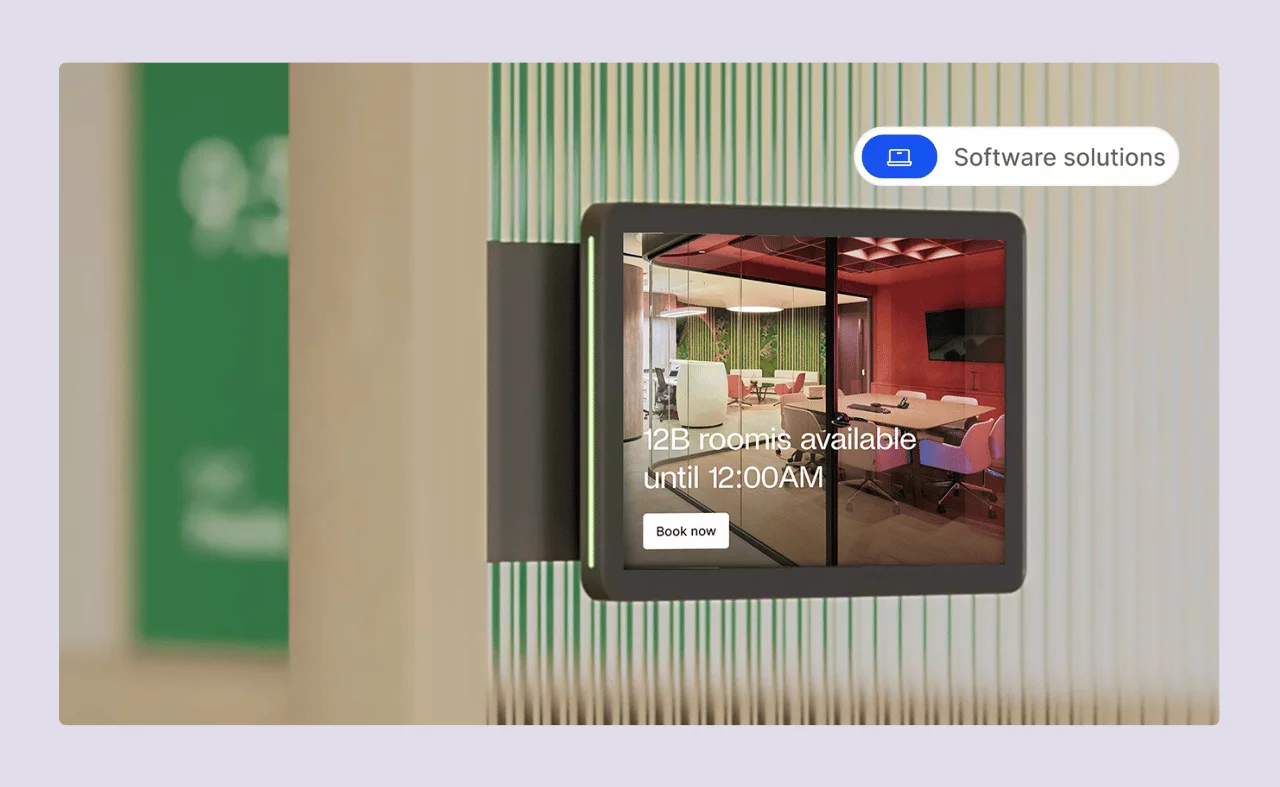
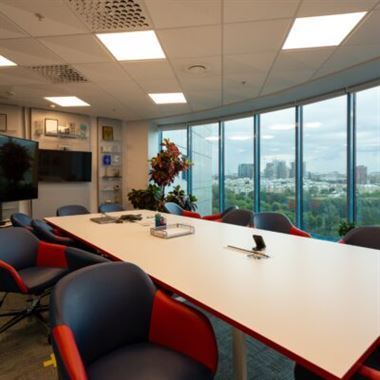

![Meeting Room Booking Template [Excel Free Download] A modern conference room with a large, dark wooden oval table surrounded by black leather chairs with armrests.](https://archieapp.co/blog/wp-content/uploads/2024/02/Meeting-room-schedule-template-cover-image-400x400.jpg)
![Work Meetings in Numbers: Latest Meeting Statistics [2025] Minimalist meeting room with a long black table, white chairs, a wall-mounted TV, and a small potted plant.](https://archieapp.co/blog/wp-content/uploads/2025/04/Meetings-statistics-cover-image-400x400.png)